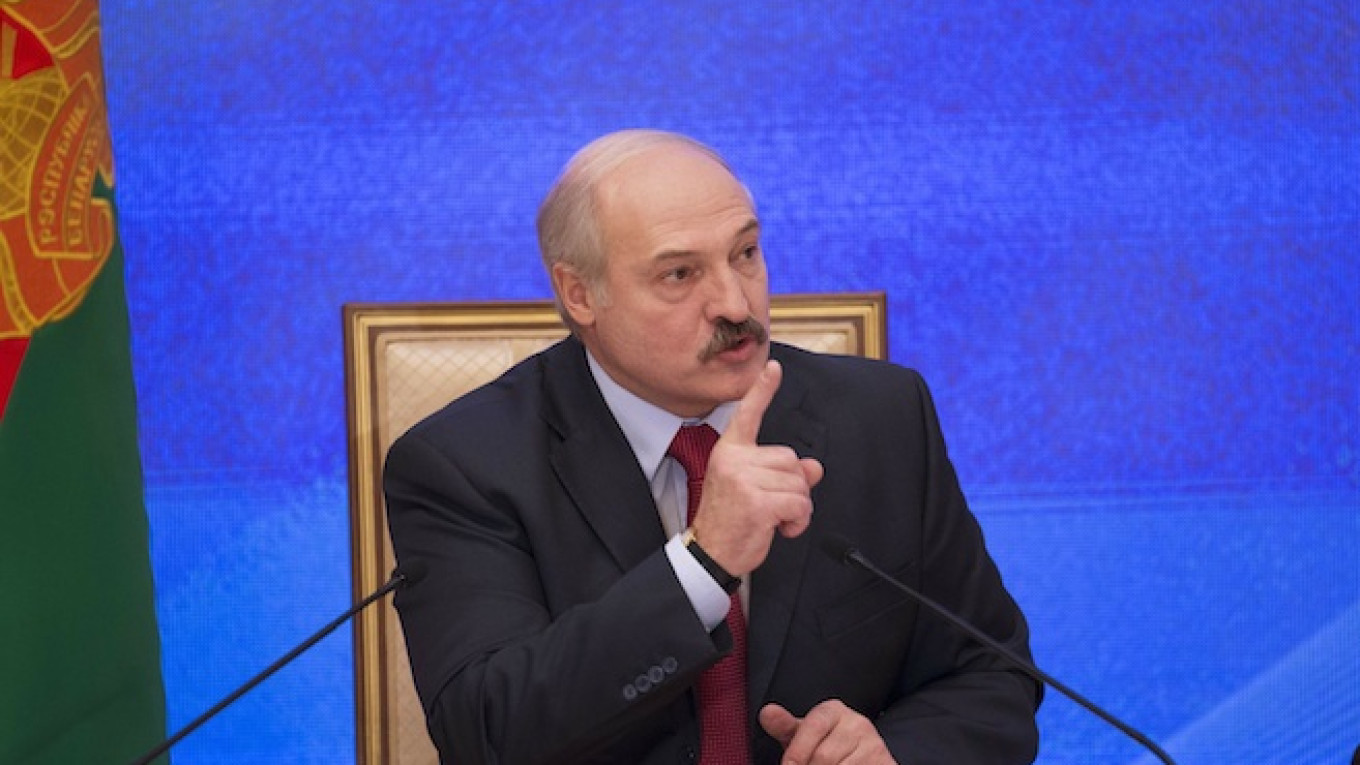MINSK — Belarussian President Alexander Lukashenko spooked bond markets on Thursday by speaking of a possible restructuring of $4 billion of Belarussian foreign debt falling due this year, then softened his comments to refer only to refinancing.
During a marathon news conference the veteran Belarussian leader made the bombshell comment that Belarus might hold talks to restructure its debts if it was struggling to repay them. That triggered a fall of 27 cents to the dollar in the value of Belarussian sovereign bonds.
But part way through his seven-hour press conference he changed his script. With a sell-off still underway in Belarus's foreign debt, he sought to reassure bondholders and spoke only of a possible "refinancing."
Belarus' Finance Ministry also hurriedly stepped in to say that the country had enough resources to fulfill its debt obligations in 2015 and that it was not considering restructuring.
The Minsk government was working with the National Bank to attract resources for refinancing part of the debt, it said in a statement. Refinancing means borrowing on the market to meet debt obligations; restructuring means re-negotiating the terms, rates and conditionality of a debt.
"Some bondholders are worrying that we are in a pre-default situation. This doesn't mean anything," Lukashenko told an annual briefing for the press, expanding on his initial comment.
"Refinancing would be good for us, but we envisage complete financing of our debts in the budget … Our bondholders should not worry or find ways to sell them [bonds] cheap."
Earlier, giving the figure for foreign-currency debt repayments due this year, Lukashenko had said: "If this becomes difficult [to repay], we will hold talks about restructuring the debt."
Belarus yield spreads over Treasuries widened 900 basis points to 1,463 bps and its 2015 and 2018 bonds were sold off in after his initial comment. The spread tightened after he softened his comments but remained 7 percentage points wider than it was at Wednesday's close, reflecting investor anxiety.
Pressuring Russia
The first reaction from analysts was that Lukashenko's comments appeared aimed at pressuring Russia, whose giant economy dominates Belarussian markets and whose own economic turmoil has rebounded on its smaller neighbor this year.
"Possibly this is Lukashenko saying, 'We will walk away from this club and even go over the other side unless you keep financing us,' " said Greg Saichin, head of emerging debt at Allianz Global Investors.
"The issue is whether he has the money or not. My impression is he doesn't have the money for everything he needs, so he will probably push Russia to give him the money."
Other commentators suggested Lukashenko might simply have misspoken.
Lukashenko said Belarus would receive up to $1 billion of further credit from Russia this year. That included $440 million from the Russia-led Eurasian Economic Union's anti-crisis fund and a further $500 million that Russia had earmarked for Belarus in its budget.
He gave no breakdown on the $4 billion due. Much of it is due this year and owed to Russia. But the sum should also include repayment of a $1 billion eurobond, with a coupon of 8.75 percent, due in August this year.
The Belarussian ruble has fallen more than a third since mid-December, caught up in the economic turmoil in Russia. That prompted Belarus to take emergency steps to defend the currency.
Belarus's $1 billion bond maturing August 2015 dropped by 27 cents and its January 2018 issue with $800 million outstanding shed 26 cents, after Lukashenko's initial comment. The issues traded at 65-70 cents to the dollar, according to Tradeweb data.
At the same news conference, Lukashenko also raised the specter of the Ukrainian conflict spreading to Belarus, re-asserted Belarus' independence and sought to reassure Belarussians that he would continue to bring them stability without upheaval.
Referring to the conflict in neighboring Ukraine, which has cost more than 5,000 lives, he spoke of the need for greater border protection. He said he could not imagine "that a Russian man could come to Belarus to fight."
Mishandling of the economy by, say, introducing "shock therapy" could lead to pitched battles in the streets of Belarus, he said. "There could be 'Maidans'," he said, referring to the street protests that ousted a Moscow-backed president in Ukraine almost a year ago.
Lukashenko has ruled the country of 9.5 millions since 1994. The U.S. once referred to as Europe's 'last dictator' and he remains shunned by the West because of his autocratic style at home.
On Thursday, he said that if he was "alive and healthy" he would run again for president at the end of this year in what will be his fifth term of office.
During his long rule, Lukashenko has frequently sought to play off Russia against the West. He was quick to contradict those who saw Belarus as "some sort of part of the Russian world". But analysts say, despite occasional swipes at Moscow, he rarely strays far enough in policy to anger the Kremlin.


